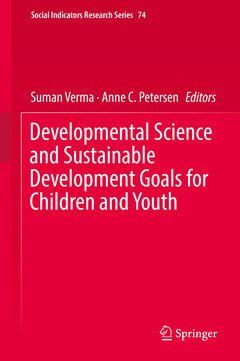Description
Developmental Science and Sustainable Development Goals for Children and Youth, 1st ed. 2018
Coordinators: Verma Suman, Petersen Anne C.
Language: English
Subjects for Developmental Science and Sustainable Development Goals...:
Keywords
Sustainable Development Goals; Positive Youth Development; Child Welfare; Well-being Indicators in Sustainable Development Goals; Measuring Development and Well-Being Indicators; Measuring Sustainable Development; Capacity Building for Development Science; Children and Youth Development; The Role of Development Research; Peacebuilding through Early Childhood Development; Enhancing the Health and Education of Deprived Children; Improving Lives of Children and Youth
Publication date: 11-2019
468 p. · 15.5x23.5 cm · Paperback
Publication date: 11-2018
468 p. · 15.5x23.5 cm · Hardback
Description
/li>Contents
/li>Biography
/li>Comment
/li>
Presents new scientific knowledge on using developmental science to improve lives of children and youth globally
Highlights emerging pathways to sustainability for children and youth
Includes cross-cultural views on the role of developmental science for sustainable youth development




